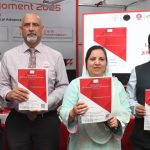External Affairs Minister, S. Jaishankar has called a spade a spade while speaking at the Raisina Dialogue organised jointly by the Minister of External Affairs and the Observer Research Foundation in New Delhi. He took the nations imposing multilateralism on the nations like India and exploiting the geopolitics to archive their own agenda at the cost of others national interest head on. He substantiated his point by saying that India immediately after independence put its trust in multilateralism and took the “Kashmir Aggression” issue to the United Nations (UN).He emphasised that the others made it into an “Accession Issue” for geopolitical reasons. Jaishankar is right. This deviation from the real issue of aggression and the atrocities inflicted by the tribal mercenaries of the Pakistan Army in 1947 inflicted genocide on the people of Jammu and Kashmir leading to grave human crisis that still persists .As the deviation from the main issue of aggression gave Pakistan a cushion to act against the people of Jammu and Kashmir by sponsoring and patronising terrorism that has violated the right to life and limb of the innocent people. Besides making lakhs of people homeless and turning them into refugees overnight. Jaishankar has underlined that multilateralism will exist side by side with national interests with the calculations and combinations. He has stressed for inclusiveness and rejected the exclusiveness. And rightly so. India cannot sacrifice its national interest at the cost of its sovereignty and territorial integrity. He called India the bridging power that has always held balanced and unbiased posture during the crisis and conflicts as far as the regional issues are concerned .Being forthright he said that we must strive for the common ground. No matter we can’t be perfect. But the objective has to be the common ground for the benefit of all. So that none feels alienated. He stated that India has a multi vector policy that we call Vishvamitra in our language. It means the friend of the world. It meant to maximise the India’s relationship in the international arena. He took the position of India regarding reforms in the United Nations Security Council(UNSC) stated by the India’s permanent representative at the UN, Ruchira Kamboj to the next level.He said that when the UN was constituted.it had nearly 50 members and at present the number of member s has went up four times that number.As such the common sense demands that the UN cannot be run with the same way as it was done when it had 50 members initially. He was clear that the rules have been gamed and that can be seen when people speak about globalisation,it has been compromised as the world trading games have been gamed.This has increased the challenges as those countries who have used the international gamed rules for their own benefits at the cost of nations like India.Creating a great challenge for the international system.be it with regard to geopolitics,climate change or carbon emission.There has been great controversy about the inclusion of new members into the Security Council. China has been opposing the India’s inclusion to the big league as the permanent member. As it wants to be the Asian hegemon and alter the Indian interests. The Rising Kashmir has analysed it comprehensively in its editorials and underlined the Chinese subversion to hold India in pincer and pose challenge to India in the Northern frontier. Opposing India’s entry into the Security Council is its geopolitical gambit. In a very nuanced manner the External affairs minister has in fact vindicated the analysis of the Rising Kashmir in the previous editorials that “the biggest opposer to UNSC reforms is not a Western Country”. A word to wise is enough. India has to be assertive and safeguard its national interests and defeat the subversive moves of such nations to damage and alter India’s resurgence. Mr. Jaishankar has taken the lead. It was much needed and timely to send a strong message.
India Deceived on Kashmir at the UN

Sign Up For Daily Newsletter
Be keep up! Get the latest breaking news delivered straight to your inbox.
By signing up, you agree to our Terms of Use and acknowledge the data practices in our Privacy Policy. You may unsubscribe at any time.
Leave a Comment
Leave a Comment
Stay Connected
Latest News
Recent Posts
- Speaker has not disallowed/ rejected Resolution on declaration of Holiday on 13th July
- 3 houses damaged, 3 firefighters injured in massive fire in Budgam village
- ACB arrests Patwari while accepting bribe in Budgam
- Sakeena Itoo addresses Triple Milestone Moment-2025 of JLNM Hospital Srinagar
- CS reviews implementation of welfare schemes for marginalized sections across J&K






